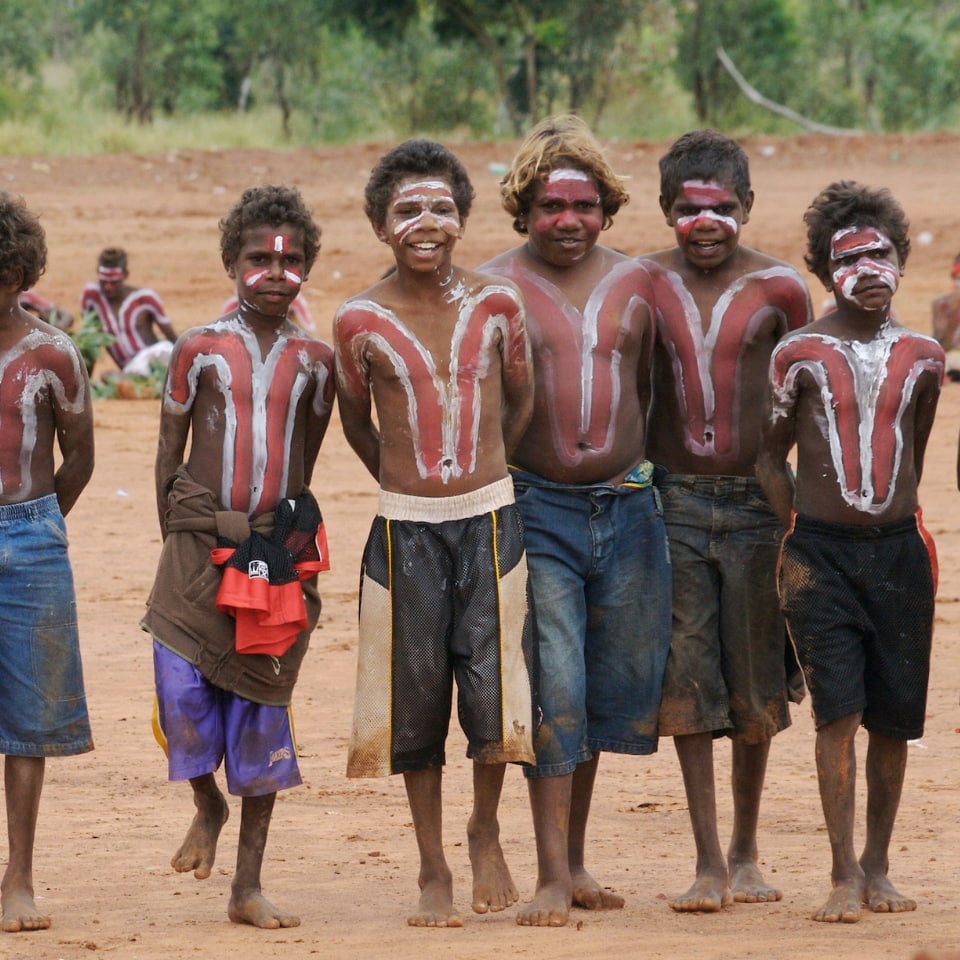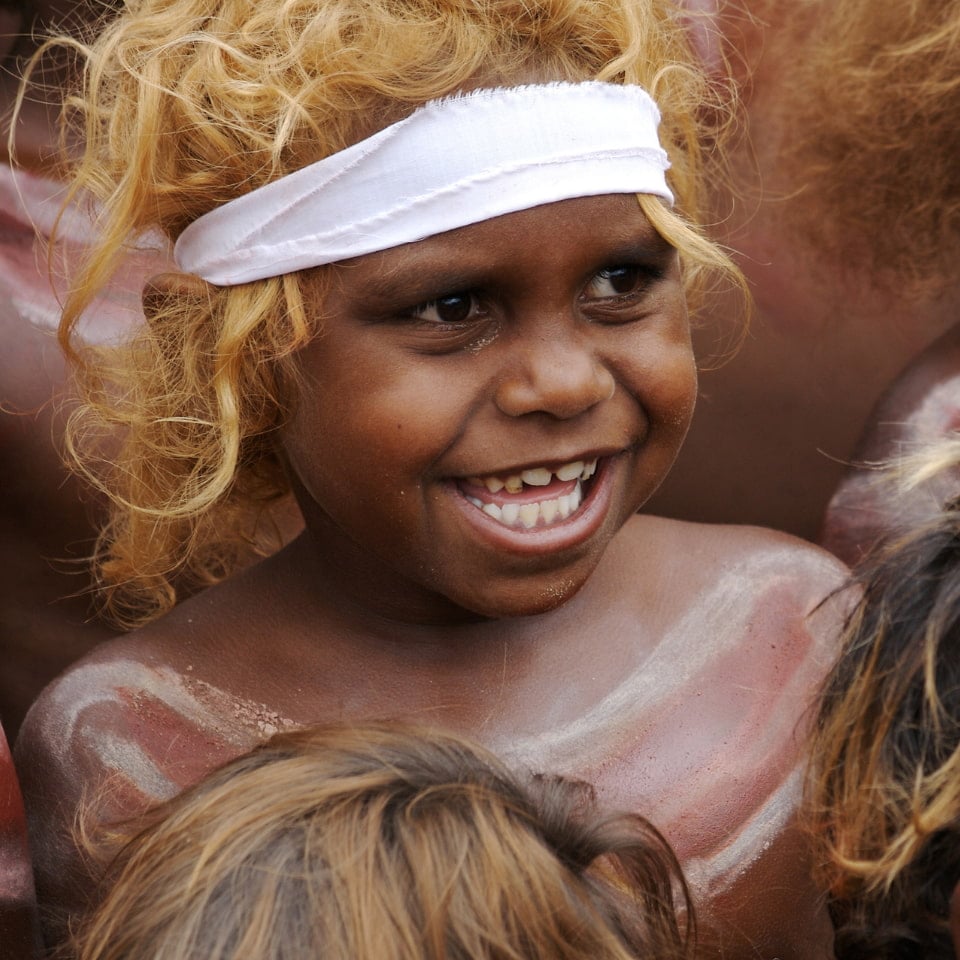Here's what we'll cover...
Click on the link to jump to sections that you're most interested in.
What does reconciliation mean to us?
Fred Hollows was an ophthalmologist and social justice activist who was outraged by the high rates of eye disease and health challenges in Aboriginal and Torres Strait Islander communities. He championed the right of Aboriginal and Torres Strait Islander peoples to the same health outcomes and life opportunities as other Australians.
Our vision for reconciliation is one where Aboriginal and Torres Strait Islander people can exercise their right to good eye health, and the organisation has strong, mutually respectful relationships with Aboriginal and Torres Strait Islander peoples.
We are also focused on considering how The Foundation as a whole can do more to promote the relationship between Aboriginal and Torres Strait Islander people and other Australians.
What is the Reconciliation Action Plan?
The RAP is a plan that mobilises staff of The Foundation around the theme of reconciliation.
It encourages staff to look for and take advantage of opportunities to support Aboriginal and Torres Strait Islander peoples and their businesses.
The Foundation’s Reconciliation Action Plan emphasises the importance of working with Aboriginal and Torres Strait Islander peoples and ensures the entire workforce is more aware of the importance of reconciliation.
The RAP represents the next stage of The Foundation’s reconciliation journey to continue Fred’s passion and desire for equality between Aboriginal and Torres Strait Islander and non-Indigenous Australians.
We've been working with Aboriginal and Torres Strait Islander communities for decades
The National Trachoma Program in the 1970s was a gamechanging program - and Fred was a big part of it, along with countless others.
Watch this video to learn more, or head to our YouTube Channel to find out about our work in Aboriginal and Torres Strait Islander communities.
Why did The Foundation develop a Reconciliation Action Plan?
In 1968, Fred Hollows was invited to a rural camp in Gurindji in the Northern Territory. There, he became especially concerned about the high number of young and old people suffering from trachoma - a treatable eye disease rarely found in the rest of Australia.
As he set out to address the inequalities in eye health through his work, Fred began to see and understand the huge injustices that Aboriginal and Torres Strait Islander people face in all facets of life.
His deep commitment to, and respect for, Aboriginal and Torres Strait Islander people, particularly their right to good health and their right to sight, is a cornerstone of The Fred Hollows Foundation and has helped shape our vision for reconciliation.
While the key part of our mission is to work with partners to deliver high quality and culturally appropriate eye care services to Aboriginal and Torres Strait Islander people in remote and under-served areas of Australia, we are also concerned with supporting Aboriginal and Torres Strait Islanders in other ways.
This is why we developed our RAP.
Download our full reconciliation action plan pdf.
What are we doing?
We believe reconciliation is part of our organisational responsibility and we, at The Fred Hollows Foundation, can do more within our organisation to promote the relationship between Aboriginal and Torres Strait Islander Australians and other Australians.
The Fred Hollows Foundation aims to achieve these goals by making practical applications within the organisation to help close the gap.
We have developed a commercial relationship with Supply Nation, an organisation that will connect The Foundation with Aboriginal and Torres Strait Islander companies that provide goods and services.
This allows us to help close the gap in a very practical way, so when The Foundation needs to buy photocopy paper, Supply Nation can connect us with an Aboriginal and Torres Strait Islander business that sells it. Or, if we have an event that requires catering, Supply Nation can organise for an Aboriginal and Torres Strait Islander catering service to provide it.
This is our small contribution towards the economic development of Aboriginal and Torres Strait Islander people and their businesses.
In order to deepen our understanding and cultural awareness of Aboriginal and Torres Strait Islander peoples, The Foundation commits to developing and implementing a cultural awareness learning and development strategy for our staff.
This includes online and face to face workshops and culturally immersive events.
A significant number of our staff are Aboriginal and Torres Strait Islander people and we plan to improve and increase outcomes for these staff within the workplace. This involves:
- Developing an internal leadership mentor program for Aboriginal and Torres Strait Islander staff;
- Developing strategies to ensure that we maintain at least of 50 per cent self-identifying Aboriginal and Torres Strait Islander staff in our Indigenous Australia Program (IAP);
- Engaging with existing Aboriginal and Torres Strait Islander staff to consult on employment strategies, including professional development and mentoring.

Our commitment
We will continue to work in partnership with Aboriginal and Torres Strait Islander peoples so their experiences and perspectives are acknowledged and valued at all levels of our organisation.
We will continue to engage with and support Aboriginal and Torres Strait Islanders in a respectful and culturally appropriate manner, as well as all work towards closing the health gap between Aboriginal and Torres Strait Islander and non-Indigenous Australians.
We will continue to promote and uphold self-determination and a strong Aboriginal and Torres Strait Islander voice in decision-making – including in the way in which the sector approaches and manages eye health and vision care for Aboriginal and Torres Strait Islander peoples.
Our progress
The Foundation has been working hard to maintain momentum and continue to deliver on organisational commitments to reconciliation and closing the gap. We:
- Support and champion Aboriginal and Torres Strait Islander peoples’ right to self-determination;
- Support the calls of the Uluru Statement from the Heart, a document that sets out the aspirations of Aboriginal and Torres Strait Islander peoples for a First Nations voice to parliament and a process for truth-telling and agreement making;
- Take an active part in campaigns such as Close the Gap to demand more action from government to improve equity in broader health outcomes for Aboriginal and Torres Strait Islander peoples;
- Hold events in our Australian offices to mark National Reconciliation Week, National Close the Gap Day and NAIDOC Week and publicly support these important campaigns;
- Hear about the experiences of Aboriginal and Torres Strait Islander staff during National Reconciliation Week;
- Renew and promote our membership of Supply Nation, offering all Australian staff the chance to seek and use Aboriginal and Torres Strait Islander businesses;
- Ensure Aboriginal and Torres Strait Islander people are recognised in our internal processes;
- Support and collaborate with Reconciliation Australia;
- Strive to maintain a 50 percent or higher employment rate of Aboriginal and/or Torres Strait Islander staff within our Indigenous Australia Program;
- Don’t compete for funding with Aboriginal and Torres Strait Islander organisations and only work in Australia where we have been invited by Aboriginal and Torres Strait Islander people to do so;
- Include an Acknowledgement of Country in all Australian offices and at the commencement of all Executive, Committee and Board meetings plus domestic ‘All Staff’ briefings.
Learn more about our work in Aboriginal and Torres Strait Islander communities.
